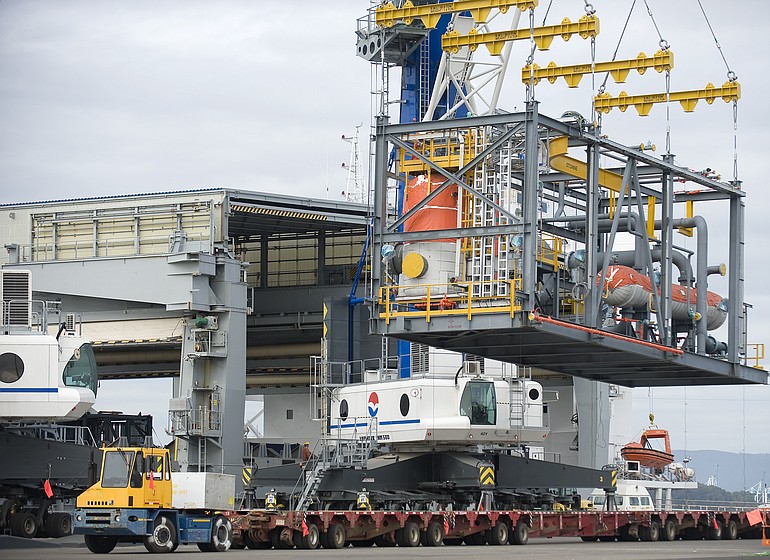They’re massive and strange-looking, and they’re trundling through Vancouver. But unless you’re a frequent nighttime traveler, you’ll miss the truckloads of enormous oil refinery equipment beginning its journey from the Port of Vancouver to a controversial energy project in Canada.
A permit issued by the Washington Department of Transportation to Mammoet Transportation Inc. — hauler for ExxonMobil and Canadian affiliate Imperial Oil — enables the company to haul four giant loads per week from the port to the Washington border in Spokane between Feb. 7 and March 7.
The truckloads will take Highway 501, or Northwest Lower River Road, and Mill Plain Boulevard — which the state owns and the city maintains — to reach downtown Vancouver’s Interstate 5 interchange. From there, they will head north on I-5 and eventually take Interstate 90 to reach Spokane.
The trucking operation will occur during off-peak travel hours and must follow specific safety rules depending on the city it’s passing through, said Alice Fiman, a spokeswoman for the state Department of Transportation. In Vancouver, for example, Washington State Patrol will escort the caravan of oil equipment. Nighttime travel will be between 10 p.m. and 5 a.m.
The hauling permit describes the maximum loads as 24 feet wide, nearly 16 feet tall, 150 feet long and weighing no more than 200,000 pounds.
Key link
Movement of the oil-refinery equipment along Washington highways is part of a larger effort by ExxonMobil and Imperial Oil to construct an oil-processing facility to develop the Kearl Oil Sands in Alberta, Canada.
The Port of Vancouver is a key link in those plans. The port began bringing in the oil-refinery equipment in October, when nine oil modules arrived, the first of 15 shiploads of an estimated 200 pieces of oil sands refinery equipment. The import operation will last through July. Some of the giant modules weigh as much as 155 tons.
The operation calls for both barging and trucking the modules to their destination. Theresa Wagner, the port’s communications manager, estimated that 24 oil modules have been barged up the Columbia and Snake rivers to the Port of Lewiston in Idaho. An undetermined number of oil modules have already been carried away from the port by truck and more will be hauled by truck under the permit issued by the state Department of Transportation.
Wagner said the plan was always to move the equipment both by truck and barge. “We’ve anticipated some of the smaller modules would go by truck,” she said. That plan also took into account the eventual need to use the trucking option because of the closure of shipping on the Columbia-Snake river system to allow the Army Corps of Engineers to replace locks and dams.
That closure occurred in December and ends in mid March.
The Port of Vancouver’s role in handling the oil equipment is connected to a three-year contract it signed in 2009 with South Korea’s Dong Bang Transport Logistics Company, which is shipping the Korean-built equipment to the port’s Terminal 2.
While the port views its handling of the oil modules as a way to bolster its marine terminal business, residents of Idaho and Montana, where the massive equipment will be trucked through scenic areas en route to Canada, have criticized the hauling operation. Environmentalists, meanwhile, oppose the development of the Kearl Oil Sands, arguing it pollutes the earth.
Fiman, the spokeswoman for the state Department of Transportation, said trucks hauling the oil modules in Washington state will travel through interstate areas, not the scenic ones that are at issue in Idaho and Montana.
The Lewiston Morning Tribune contributed to this story.




